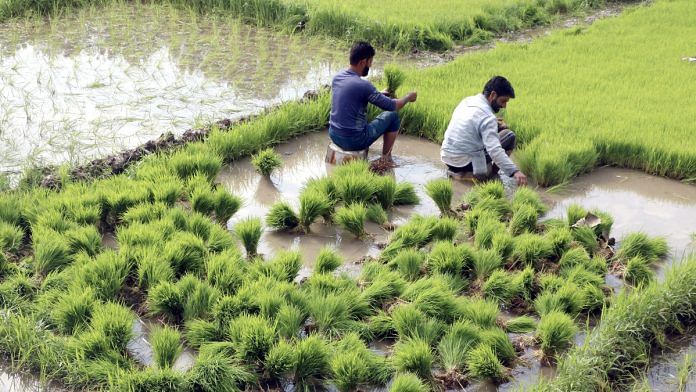New Delhi: Faced with heavy rains that threaten the value of their basmati crop, farmers in Haryana are demanding the right to sell their early-harvest produce directly to rice mill owners, bypassing arhtiyas, or commission agents.
An “indefinite strike” has been called by the arhtiyas due to new electronic-transaction procedures, they are upset that it passes payments directly to farmers without ensuring they receive their commission. This has led to the closure of local grain markets, or mandis, where the farmers usually sell and store their produce.
Experts have told ThePrint that the harvest that has now piled up could sharply deteriorate if rainfall continues.
Close to 30 per cent of Haryana’s basmati is under threat because of the lack of dry storage space, and the absence of specialised equipment to dry-out paddy, they warned.
Vijay Setia, former President of the All-India Rice Exporters’ Association told ThePrint, “For the past three days, there have been incessant rains in all parts of Haryana that produce different types of basmati. The early varieties of paddy that are harvested have a moisture content of 20 per cent to 30 per cent. Therefore they cannot be stored for a longer duration, not even for 24 hours, since the crop will slowly deteriorate and their price will diminish.”
“These crops are currently in makeshift storage structures built by the farmers that are not sufficient,” he said.
“Farmers are keen on selling their harvested produce to the rice mill owners because they have the infrastructure to dry most crops, which the mandis do not,” Setia said.
“There are Basmati varieties that mature sooner than the rest and if not stored properly they begin sprouting. The state Government should recognise the fact that if there are losses then the brunt will be faced by farmers,” he explained.
The farmers, led by Haryana Bhartiya Kisan Union (Charuni) president Gurnam Singh Charuni, had blocked the Delhi-Chandigarh highway over the procurement delay.
The 20-hour blockade was lifted earlier today after the government said that procurement would begin from October 1 and agreed to consider procuring 30 quintals of paddy per acre instead of the earlier 22 quintals as per the farmers’ demands.
India produces 34 varieties of basmati rice that have been notified under the seeds Act, 1966. The union territory of Jammu and Kashmir along with states like Himachal Pradesh, Punjab, Haryana, Uttarakhand and western Uttar Pradesh are responsible for the approximately 400 lakh hectares of paddy cultivation in India.
Close to 13 lakh hectares were under paddy cultivation this year and according to officials, 30 per cent of these crops are early varieties with high moisture content.
(Edited by Theres Sudeep)
Also Read: ‘Don’t be alarmed yet’, scientists say as they probe paddy stunting in 4 states



